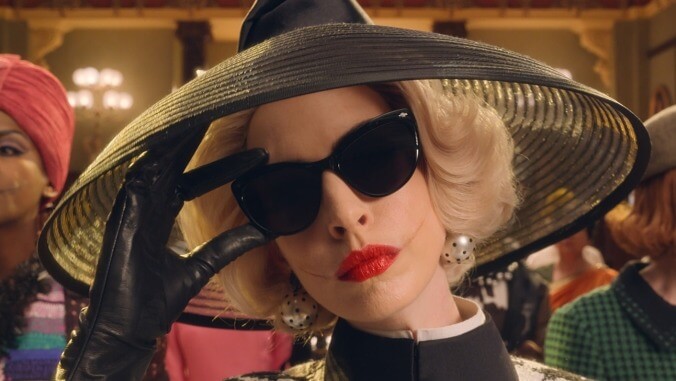The funny thing about apologies is, they’re exceedingly easy once you’ve seen a few decent examples. The properties of what we feel is a thoroughly satisfying “we messed up” statement include (but are certainly not limited to): a summary of the action in question, recognition and emphasis of said action’s impact rather than the intent, and a plan to make amends (or, at minimum, a promise to not make such a boneheaded choice in the future). For good measure, the words “We’re sorry” should exist somewhere—anywhere, really—within the statement, just to drive home the point that one is, well, actually sorry for the aforementioned harm, whether it was intentional or simply careless. Warner Bros. had an excellent opportunity to set a decent example of its own after The Witches’ depiction of Anne Hathaway’s Grand High Witch caused some backlash within the disabled community. Instead, the studio chose the Dwight Schrute method of stating regret and not really recognizing the issue at its core, per a report from Deadline.
To backtrack just a little: In Robert Zemeckis and Guillermo del Toro’s adaptation of the Roald Dahl classic, the Grand High Witch is shown to have hands that are missing two fingers each, resembling those with a limb difference classified as ectrodactyly, or “split hand.” (You can head over to Deadline’s report for a reference image.) Those familiar with the original story noted that this particular choice was not specified anywhere in the novel, meaning that it was solely a product of the production’s creative team. British Paralympic swimmer Amy Marren called out the studio for linking that imagery to the witches in the film, who are meant to be viewed as scary individuals. “Yes, I am fully aware that this is a film, and these are Witches,” Marren stated. “But witches are essentially monsters. My fear is that children will watch this film, unaware that it massively exaggerates the Roald Dahl original and that limb differences begin to be feared.”
In response, a representative of Warner Bros. told Deadline that the studio was “deeply saddened to learn that our depiction of the fictional characters in The Witches could upset people with disabilities” and that it “regretted any offense caused.” The statement continued: “In adapting the original story, we worked with designers and artists to come up with a new interpretation of the cat-like claws that are described in the book. It was never the intention for viewers to feel that the fantastical, non-human creatures were meant to represent them.”
Other organizations like The Lucky Fin Project and the Paralympic Games have called out the film, but neither have commented on the studios’ statement as of yet. The Witches began streaming on HBO Max on October 22 and stars Hathaway, Octavia Spencer, Stanley Tucci, and Chris Rock.

